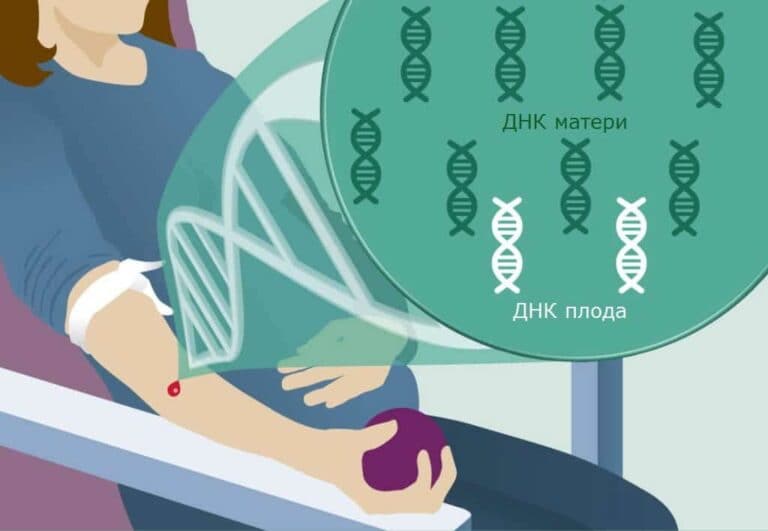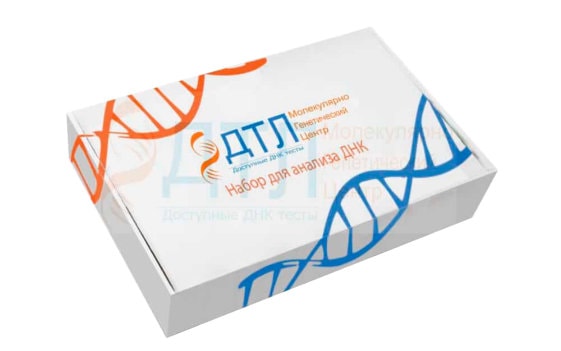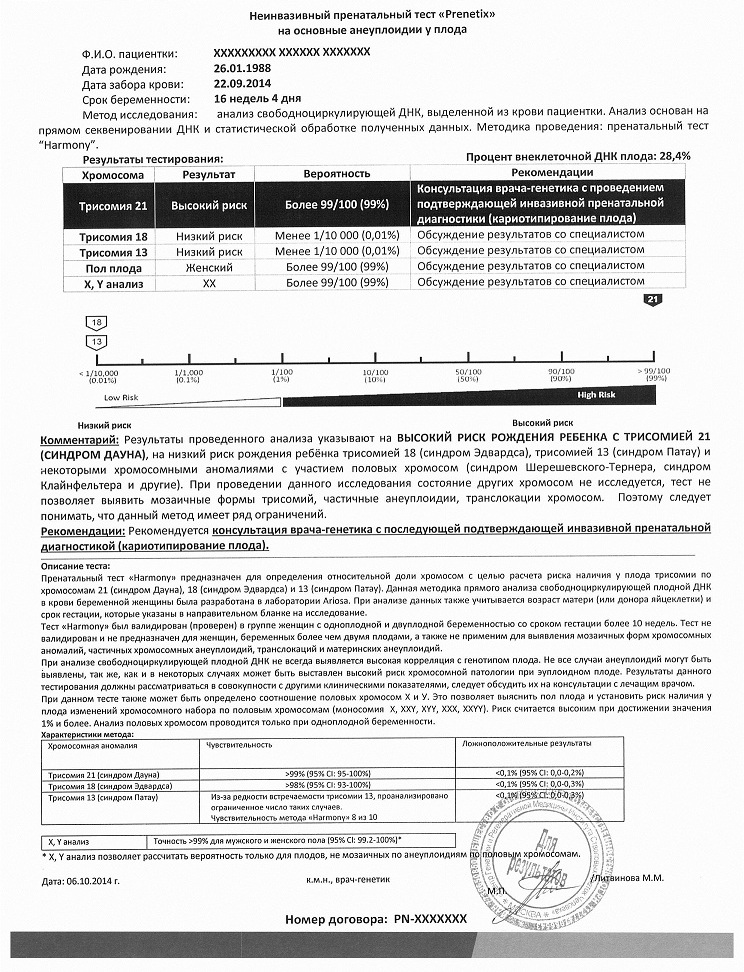Non-invasive Prenatal First Test in Mogilev
First Test by Genetics is a non-invasive prenatal screening (NIPS) for common chromosomal abnormalities. This is a modern method of prenatal testing based on the analysis of fetal DNA from the mother’s venous blood. It is completely safe and poses no risk to the fetus.
NIPT is recommended for all pregnant women, as it is more accurate than biochemical screening and ultrasound in detecting genetic disorders. You can take the test as early as the 10th week of pregnancy.
The information obtained allows expectant parents to accurately identify or rule out the presence of serious and sometimes life-incompatible syndromes in the fetus, such as Down syndrome and other chromosomal abnormalities.
Gender determination of the baby is FREE (if you don’t want to know, please let us know in advance)!
Don’t want to go to the office? It’s possible!
Call a courier to pick up your DNA samples.
Order a mobile service visit to your home or office.
Same-day service is available.
For a free consultation, please call:
+375 293 206 979You don’t need a doctor’s referral to take this test. NIPT has no specific conditions or indications. The analysis is the most accessible to date and is performed at the woman’s request.To undergo a non-invasive DNA test for fetal chromosomal abnormalities, you need to:
- Call us or fill out the “Feedback” form.
- Receive a free consultation with a specialist and book an appointment.
- Have your blood drawn.
- Receive your results within 8–10 business days.
The non-invasive First Test from Genetics allows identification of risks for the following conditions:
| First Test 21 | First Test Light | First Test Medium | First Test |
| 19 990 RUB | 21 990 RUB | 21 990 RUB | 21 990 RUB |
| Down syndrome (trisomy 21) | Down syndrome (trisomy 21) | Down syndrome (trisomy 21) | Down syndrome (trisomy 21) |
| Patau syndrome (trisomy 13) | Patau syndrome (trisomy 13) | Patau syndrome (trisomy 13) | |
| Edwards syndrome (trisomy 18) | Edwards syndrome (trisomy 18) | Edwards syndrome (trisomy 18) | |
| Sex chromosome aneuploidies: | Sex chromosome aneuploidies: | ||
| Turner syndrome (45, XO) | Turner syndrome (45, XO) | ||
| X chromosome trisomy (47, XXX) | X chromosome trisomy (47, XXX) | ||
| Klinefelter syndrome (47, XXY) | Klinefelter syndrome (47, XXY) | ||
| Jacobs syndrome — Y chromosome disomy (47, XYY) | Jacobs syndrome — Y chromosome disomy (47, XYY) | ||
| XXYY syndrome (48, XXYY) | XXYY syndrome (48, XXYY) | ||
| From week 10 of pregnancy | From week 10 of pregnancy | From week 10 of pregnancy | From week 10 of pregnancy |
| Processing time: 8–10 days | Processing time: 8–10 days | Processing time: 8–10 days | Processing time: 8–10 days |
| Baby’s gender — FREE | Baby’s gender — FREE | Baby’s gender — FREE | Baby’s gender — FREE |
| ORDER | ORDER | ORDER | ORDER |
Normally, a person has 46 chromosomes grouped into 23 pairs. If this number changes, it may lead to the development of various syndromes. One of the most well-known is Down syndrome, also known as trisomy 21. It is the most common chromosomal abnormality.
However, other chromosomal anomalies also exist, such as trisomy 13 and 18. These are compatible with life but are associated with multiple developmental defects. Sometimes, such anomalies are not detected through biochemical screening or ultrasound.
That’s why international obstetrics and gynecology associations recommend performing the full First Test screening for the 8 most common syndromes. This allows early detection of potential chromosomal abnormalities and timely intervention.
Results of Non-Invasive Prenatal Screening
The report provides a clear, easy-to-interpret result indicating high or low risk of chromosomal abnormality.
- Low risk: Indicates no chromosomal diseases with accuracy greater than 99%.
- High risk: Increased likelihood of a chromosomal abnormality. All high-risk results must be confirmed by invasive methods (chorionic villus sampling or amniocentesis).
- No result: If the fetal DNA fraction in the sample is below 3.5%, a repeat collection may be necessary. This is because a low fetal DNA fraction can produce a false negative, typically seen in patients with a high body mass index.
Indications for First Test in Early Pregnancy
It is recommended to undergo the non-invasive prenatal DNA test in the following situations:
- Risk of chromosomal abnormalities detected by ultrasound and biochemical screening.
- Woman’s age over 35 years and man’s age over 40 years.
- Presence of hereditary diseases or children with chromosomal abnormalities in the family.
- Mother or father diagnosed with chromosomal disorders.
- History of adverse pregnancy outcomes (miscarriage, stillbirths, infertility).
- If you have had illnesses during pregnancy.
- Use of IVF (in vitro fertilization).
Since fetal aneuploidies can also occur outside risk groups, we recommend NIPT testing for all pregnant women to be confident about their child’s health. The test can also be done in case of twin pregnancy!
Contraindications for First Test
First Test is an effective and safe method for detecting chromosomal abnormalities. This high-tech screening has almost no contraindications and provides full informativeness. However, it is not recommended in case of:
- Triplet or higher-order pregnancies;
- Pregnancy less than 9 weeks.
Other limitations may include:
- Parental chromosomal aberrations (balanced translocations and inversions, sex chromosome aneuploidies, mosaicism in maternal somatic cells);
- Mother’s oncological diseases;
- «Vanishing» twin syndrome;
- Organ or bone marrow transplantation, stem cell therapy;
- Allogeneic blood transfusion within one year;
- Treatment with human serum albumin and/or exogenous DNA cells within four weeks;
- Heparin therapy within 24 hours.
DNA Laboratory licenses and certificates
How to Do a Non-invasive Prenatal Test First Test

Any woman can order the test at an early stage of pregnancy (starting from the 10th week). For this, it is enough to give a venous blood sample at a clinic and fill out a questionnaire. From the collected biomaterial, fetal DNA is extracted in the laboratory, and after molecular genetic analysis, a report with results for each chromosome is issued.
Unlike invasive methods, NIPT is performed using the mother’s blood and is completely safe both for her health and for the health of the future child. NIPT directly analyzes fetal DNA, which provides a detection accuracy of 99% for trisomies of chromosomes 21, 18, and 13.
NIPT can be performed in cases of single or twin pregnancies. The test is recommended for pregnancies conceived both naturally and through IVF, as well as in donor programs and surrogacy (only in the case of single pregnancies).
Where to take the noninvasive prenatal test First Test

It is possible to take a non-invasive prenatal DNA test:
- You can use the form «Pre-appointment» to schedule an appointment or come to our genetic center at any time convenient for you.
See step-by-step instructions see here. - Do it yourself at home:
- Order by courier our branded kit, specially designed for self-collection of DNA samples.
- Using ordinary cotton swabs (ear swabs) from a pharmacy. Our instructions.
- Order a specialist visit to your home for free.
Why the DNA Center «DTL» is the Best in Mogilev
How to pay for a non-invasive prenatal First Test and get the result
For your convenience, there are several options for cash and non-cash payment of the DNA test:
- At our DNA centers, by cash or bank card.
- Online payment on the website of our DNA center.
- At bank branches.
- By bank transfer (for legal entities).
When filling out the application for a DNA test, you can choose how to receive the genetic test results:
- In person at the DNA center.
- By the email address you specified in the application form.
- By courier service across Belarus.
- If you have taken a legal (court-ordered) DNA test, we can send the forensic genetic report to the court’s address.
- If you require another method of delivery, you can specify it in the application form.
Each order is assigned a unique identification number. The laboratory guarantees 100% security and confidentiality of all data received from you.
First Test DNA Test in Mogilev
There are cases when ultrasound and biochemical screening do not detect abnormalities, the mother feels perfectly well, and the pregnancy proceeds without complications. However, children with Down syndrome are born in the end. This test helps to eliminate false results so that your pregnancy goes without stress and worries.
By taking the First Test from Genetics at Mogilev with us, you receive free determination of the baby’s gender.
Please note: NIPT is not a therapeutic service, pharmaceutical consultation, medical care, a device for diagnostic purposes or medical tests, a medical instrument, testing equipment, or a medical service.
Get a free consultation and take the DNA test at Mogilev by filling out the form on our website or by calling: +375 293 206 979 available 24/7.
First Test DNA Test



Узнавали свои корни, требовалось для завещания, родственник сказал, что только официальной бумаге поверит. Вот получили её здесь, быстро и цену не заломили








Thank you for feedback. It will be checked by a moderator soon.
The «DTL» DNA Center conducts DNA testing throughout the entire Belarus. The laboratory uses equipment from Applied Biosystems, a global leader in biotechnology. Modern scientific and technological advancements enable us to perform unique DNA tests that are offered by only a few laboratories worldwide. All tests are carried out exclusively by certified specialists, including world-class experts with over 15 years of experience in DNA research.
Our center has offices in many cities across Belarus, making it possible to submit samples in virtually any city, including smaller towns across the country.





